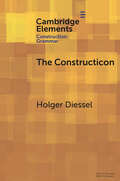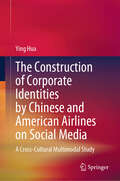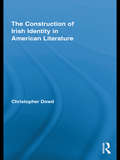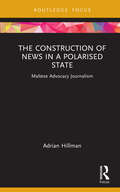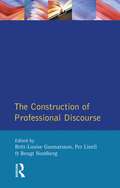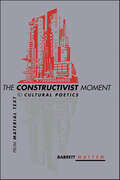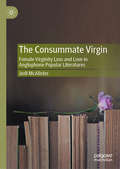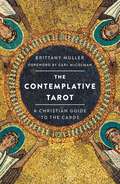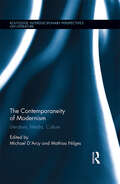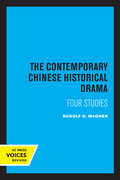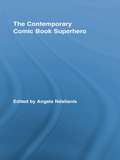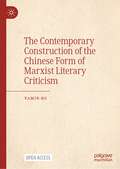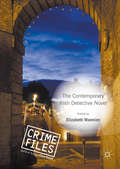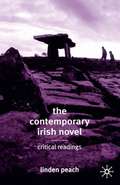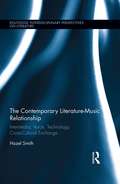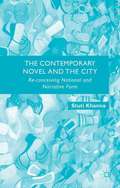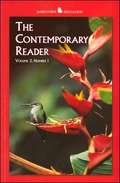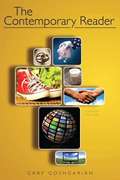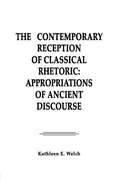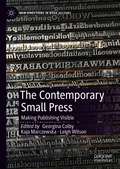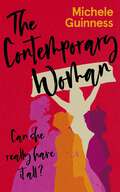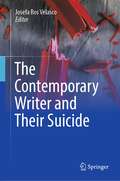- Table View
- List View
The Constructicon: Taxonomies and Networks (Elements in Construction Grammar)
by Holger DiesselIt is one of the central claims of construction grammar that constructions are organized in some kind of network, commonly referred to as the constructicon. In the classical model of construction grammar, developed by Berkeley linguists in the 1990s, the constructicon is an inheritance network of taxonomically related grammatical patterns. However, recent research in usage-based linguistics has expanded the classical inheritance model into a multidimensional network approach in which constructions are interrelated by multiple types of associations. The multidimensional network approach challenges longstanding assumptions of linguistic research and calls for a reorganization of the constructivist approach. This Element describes how the conception of the constructicon has changed in recent years and elaborates on some central claims of the multidimensional network approach.
The Construction Alphabet Book (Jerry Pallotta's Alphabet Books)
by Jerry PallottaFor fans of all things that go this noisy alphabet book explores construction equipment from A to Z. Find out about these construction machines and more, from a huge saw that cuts through roads to a massive vacuum that sucks up boulders. You'll even learn a quick and easy recipe for concrete. Rock crushers, jackhammers, and wrecking balls will delight the youngest of readers learning their ABCs. Jerry Pallotta's trademark humor punctuates the informative text. Vibrant oil paintings bring to life a busy construction site.
The Construction of Corporate Identities by Chinese and American Airlines on Social Media: A Cross-Cultural Multimodal Study
by Ying HuaUsing top Chinese and American airlines as examples, this book approaches the construction of corporate identities on social media, a critical issue in corporate communication, from a cross-cultural multimodal perspective. Through a holistic and systematic multimodal analysis, it provides a comprehensive cross-cultural understanding of corporate identity construction on social media. By developing an integrated social semiotic framework based on registerial cartography in SFL, it investigates the airlines’ registerial activity patterns in terms of macro-level configuration and micro-level multimodal realizations, interprets their situated contextual patterns that delineate the construction of corporate identities and further explains the influence of cultural factors. Given that this book offers theoretical contributions to corporate identity and cross-cultural communication research, practical guidance on PR practices, especially in the context of Chinese enterprises going global, and pedagogical insights for business communication courses, this book will be of particular benefit to researchers in linguistics, management and communication studies, PR practitioners, and both lecturers and learners of business communication courses.
The Construction of Irish Identity in American Literature (Routledge Transnational Perspectives On American Literature Ser. #13)
by Christopher DowdThis book examines the development of literary constructions of Irish-American identity from the mid-nineteenth century arrival of the Famine generation through the Great Depression. It goes beyond an analysis of negative Irish stereotypes and shows how Irish characters became the site of intense cultural debate regarding American identity, with some writers imagining Irishness to be the antithesis of Americanness, but others suggesting Irishness to be a path to Americanization. This study emphasizes the importance of considering how a sense of Irishness was imagined by both Irish-American writers conscious of the process of self-definition as well as non-Irish writers responsive to shifting cultural concerns regarding ethnic others. It analyzes specific iconic Irish-American characters including Mark Twain’s Huck Finn and Margaret Mitchell’s Scarlet O’Hara, as well as lesser-known Irish monsters who lurked in the American imagination such as T.S. Eliot’s Sweeney and Frank Norris’ McTeague. As Dowd argues, in contemporary American society, Irishness has been largely absorbed into a homogenous white culture, and as a result, it has become a largely invisible ethnicity to many modern literary critics. Too often, they simply do not see Irishness or do not think it relevant, and as a result, many Irish-American characters have been de-ethnicized in the critical literature of the past century. This volume reestablishes the importance of Irish ethnicity to many characters that have come to be misread as generically white and shows how Irishness is integral to their stories.
The Construction of News in a Polarised State: Maltese Advocacy Journalism (Routledge Focus on Communication and Society)
by Adrian HillmanTaking a qualitative approach based on original case studies, this book offers a detailed overview of the contemporary media system in Malta. Three Maltese news organisations are examined to understand the editorial routines, ownership and management structures, and social and cultural factors that affect the day-to-day business of creating news. In-depth interviews with key stakeholders of each organisation are conducted alongside qualitative textual analysis of the content they publish. Contrary to previous research, the work finds that advocacy continues to dominate Maltese journalism, indicating that the country has retained similarities to other media systems within its geographic region. While recognising that the gold standard in journalism is judged to be objectivity and balance, a case is made for a responsible, measured form of advocacy journalism to extend media diversity and contribute to a high level of national political engagement. Presenting an informed case for the need to pay closer attention to small states, especially at a time when many countries are seen to be becoming increasingly socially and politically divided, The Construction of News in a Polarised State is an insightful text for scholars and academics in the fields of media and communication studies, political science, and sociology.
The Construction of Professional Discourse (Language In Social Life)
by Per Linell Bengt Nordberg B.L. GunnarssonInternationally, there is increasing research and interest in the processes of the production and reception of texts for specific purposes and in the historical development of genres and registers within Languages for Specific Purposes (LSP), psycholinguistics, sociolinguistics, anthropology and the sociology of science. Studies of professional communication have traditionally been biased towards the written medium and have been carried out with little, if any, connection to LSP. Disciplinary boundaries and interest groupings have thus kept these different approaches to the study of professional communication and interaction separate. The editors of this volume unite these different perspectives and approaches and bring together recent research from linguistics, sociolinguistics, ethnography of communication, anthropology and sociology to provide an up-to-date analysis of different varieties of professional discourse and their historical development. Chapters written by leading exponents in the field deal with the core theoretical issue of how language, written genres and spoken discourse are constructed as a successive and continuous interplay between language and social realities. The volume includes chapters on the moral construction of discourse in the social care profession, the discourse of dispute negotiation, narrative accounts in clinical research, doctor-patient interaction, legal and other kinds of institutional discourse.A key text for students of applied linguistics and sociolinguistics at both advanced, undergraduate and MA levels.
The Constructivist Moment: From Material Text to Cultural Poetics
by Barrett WattenWinner of the American Comparative Literature Association's Rene Wellek Prize (2004) As one of the founding poets and editors of the Language School of poetry and one of its central theorists, Barrett Watten has consistently challenged the boundaries of literature and art. In The Constructivist Moment, he offers a series of theoretically informed and textually sensitive readings that advance a revisionist account of the avant-garde through the methodologies of cultural studies. His major topics include American modernist and postmodern poetics, Soviet constructivist and post-Soviet literature and art, Fordism and Detroit techno—each proposed as exemplary of the social construction of aesthetic and cultural forms. His book is a full-scale attempt to place the linguistic turn of critical theory and the self-reflexive foregrounding of language by the avant-garde since the Russian Formalists in relation to the cultural politics of postcolonial studies, feminism, and race theory. As such, it will provide a crucial revisionist perspective within modernist and avant-garde studies.
The Consummate Virgin: Female Virginity Loss and Love in Anglophone Popular Literatures
by Jodi McAlisterThis book is a study of female virginity loss and its representations in popular Anglophone literatures. It explores dominant cultural narratives around what makes a “good” female virginity loss experience by examining two key forms of popular literature: autobiographical virginity loss stories and popular romance fiction. In particular, this book focuses on how female sexual desire and romantic love have become entangled in the contemporary cultural imagination, leading to the emergence of a dominant paradigm which dictates that for women, sexual desire and love are and should be intrinsically linked together: something which has greatly affected cultural scripts for virginity loss. This book examines the ways in which this paradigm has been negotiated, upheld, subverted, and resisted in depictions of virginity loss in popular literatures, unpacking the romanticisation of the idea of “the right one” and “the right time”.
The Contemplative Tarot: A Christian Guide to the Cards
by Brittany Muller“This insightful book will help you to see both the cards—and Christian spirituality—in surprising new ways."— Carl McColman, author of The Big Book of Christian Mysticism and Eternal HeartIn the chaos of daily life, many Christians long for the time and mental clarity to reflect on scripture, to worship, and to pray. The Tarot can become an unexpected tool in this journey, inviting us to pause, contemplate, and find insight and wisdom in our walk. In The Contemplative Tarot, author Brittany Muller draws deeply on Christian tradition and theology to create a tarot practice built on spiritual reflection, prayer, and worship.The Tarot has held countless meanings to countless readers over the course of its existence, but The Contemplative Tarot offers a uniquely Christian interpretation of the cards, including Bible verses and meditations on each of their spiritual meanings. Brittany provides practical guidance on how to use the cards in a Christian context, whether as prompts for personal prayer, daily reminders of spiritual truths, or as part of a more structured practice such as the Ignatian examen.The Contemplative Tarot offers a thoughtful, introspective new interpretation of the Tarot and an invitation to create powerful moments of reflection and worship in your daily life.
The Contemporaneity of Modernism: Literature, Media, Culture (Routledge Interdisciplinary Perspectives on Literature)
by Mathias Nilges Michael D'ArcyAt a juncture in which art and culture are saturated with the forces of commodification, this book argues that problems, forms, and positions that defined modernism are crucially relevant to the condition of contemporary art and culture. The volume is attuned to the central concerns of recent scholarship on modernism and contemporary culture: the problems of aesthetic autonomy and the specific role of art in preserving a critical standpoint for cultural production; the relationship between politics and the category of the aesthetic; the problems of temporality and contemporaneity; literary transnationalism; and the questions of medium and medium specificity. Ranging across art forms, mediums, disciplines, and geographical locations, essays address the foundational questions that fuse modernism and the contemporary moment: What is art? What is the relation between art and the economy? How do art and technology interpenetrate and transform each other? What is modernism’s logic of time and contemporaneity, and how might it speak to the problem of thinking genuine novelty, or the possibility of an alternative to the current stage of neo-liberal capitalism? What is modernism, and what is its history? The book is thus committed to revising our understanding of what modernism was in its earlier instantiations, and in accounting for the current moment, addressing the problems raised by modernism's afterlives and reverberations in the 20th and 21st centuries. The volume includes essays that consider literature, sociology, philosophy, visual art, music, architecture, digital culture, television, and other artistic media. It synthesizes the most recent thinking on modernism and contemporary culture and presents a compelling case for what happens to literature, art, and culture in the wake of the exhaustion of postmodernism. This book will be of interest to those studying literature, visual art, media studies, architecture, literary theory, modernism, and twentieth-century and contemporary culture more generally.
The Contemporary Anglophone Travel Novel: The Aesthetics of Self-Fashioning in the Era of Globalization (Literary Criticism and Cultural Theory)
by Stephen M. LevinThe Contemporary Anglophone Travel Novel explores the themes of alienation and displacement in a genre of post-World War II novels that portrays the pursuit of an authentic travel experience in a culturally unfamiliar place. Levin explores two questions: why does travel to an "undiscovered" place—one imagined outside the bounds of modernity—remain an enduring preoccupation in western civilization; and how does the representation of adventure travel change in the era of mass culture, when global capitalism expands at a rapid pace. The book argues that whereas travel writers between the wars romanticized their journeys overseas, travel writing after World War II takes an increasingly melancholic and nihilistic view of a commercial society in which adventure travel no longer proves capable of producing a sense of authentic selfhood. Through close analysis of specific texts and authors, the book provides a rich discussion of anglophone literature in the cultural context of the twentieth-century. It examines the capacity of popular culture for social critique, the relationship between leisure travel and postcolonial cultures, and the idealization of selfhood and authenticity in modern and postmodern culture. The study reflects the best potential of interdisciplinary scholarship, and will prove influential for anyone working in the fields of contemporary literature, cultural theory, and cross-cultural studies.
The Contemporary Chinese Historical Drama: Four Studies
by Rudolf G. WagnerChina's "Great Leap Forward" of 1958-1961 was a time of official rejoicing over the achievements of Communism, but it was also a time of immense suffering. Growing dissent among intellectuals stimulated creativity as writers sought to express both their hope for the success of the revolution and their dissatisfaction with the Party leadership and policies. But the uneasy political climate and the state's control over literature prevented writers from directly addressing the compelling problems of the time. Rather, they resorted to a variety of sophisticated and time-honored forms for airing their grievances, including the historical drama. Rudolf Wagner examines three of these plays written and performed between 1958 and 1963 in an effort to decode their hidden political and cultural meanings. He also provides a broad survey of the politics of the historical drama in China, suggesting further avenues of inquiry into the relationship between literature and the state. This title is part of UC Press's Voices Revived program, which commemorates University of California Press’s mission to seek out and cultivate the brightest minds and give them voice, reach, and impact. Drawing on a backlist dating to 1893, Voices Revived makes high-quality, peer-reviewed scholarship accessible once again using print-on-demand technology. This title was originally published in 1990.
The Contemporary Comic Book Superhero (Routledge Research in Cultural and Media Studies)
by Angela NdalianisOver the last several decades, comic book superheroes have multiplied and, in the process, become more complicated. In this cutting edge anthology an international roster of contributors offer original research and writing on the contemporary comic book superhero, with occasional journeys into the film and television variation. As superheroes and their stories have grown with the audiences that consume them, their formulas, conventions, and narrative worlds have altered to follow suit, injecting new, unpredictable and more challenging characterizations that engage ravenous readers who increasingly demand more.
The Contemporary Construction of the Chinese Form of Marxist Literary Criticism
by Yamin HuThis is an open access book. This book is the first comprehensive and systematic study on the Chinese Marxist literary criticism as an independent theoretical form. It discusses and describes the theoretical features of the Chinese form of Marxist literary criticism by refining and re-interpreting the iconic key concepts of “people,” “nation,” “politics,” “praxis,” and the relationships between literature and high-tech, literature and capital. The value judgment of literary criticism has also been discussed at length, and insightful and valuable views have been provided. This book is a brilliant introduction and the ideal academic material for global readers to grasp the essence of Chinese Marxist literary thoughts.
The Contemporary Irish Detective Novel
by Elizabeth MannionIrish detective fiction has enjoyed an international readership for over a decade, appearing on best-seller lists across the globe. But its breadth of hard-boiled and amateur detectives, historical fiction, and police procedurals has remained somewhat marginalized in academic scholarship. Exploring the work of some of its leading writers--including Peter Tremayne, John Connolly, Declan Hughes, Ken Bruen, Brian McGilloway, Stuart Neville, Tana French, Jane Casey, and Benjamin Black--The Contemporary Irish Detective Novel opens new ground in Irish literary criticism and genre studies. It considers the detective genre's position in Irish Studies and the standing of Irish authors within the detective novel tradition. Contributors: Carol Baraniuk, Nancy Marck Cantwell, Brian Cliff, Fiona Coffey, Charlotte J. Headrick, Andrew Kincaid, Audrey McNamara, and Shirley Peterson.
The Contemporary Irish Novel: Critical Readings
by Linden PeachThis essential guide offers innovative critical readings of key contemporary novels from Ireland and Northern Ireland. Linden Peach discusses texts that are representative of the richness of Irish writing during the 1980s and 1990s, and reads works by established authors alongside those by the new generation of writers. The novels examined include works by John Banville, Jennifer Johnston, Roddy Doyle, Emma Donoghue, Seamus Deane, William Trevor, Dermot Bolger, Joseph O'Connor, Patrick McCabe, Mary Morrissy, Glenn Patterson and Robert McLiam Wilson. The Contemporary Irish Novel addresses themes such as ghosts and haunting, mimicry, obedience and subversion, the relocation and reinscription of identity, the mother figure, parent-child relations, madness, masculinity, self-harm, sexuality, domestic violence, fetishism and postmodernity. Drawing on a range of critical approaches including postcolonial, gender and psychoanalytic theory, Peach explores and celebrates the diversity of Irish fiction and suggests that the boundary between literature and theory is as permeable as that between Ireland and Northern Ireland.
The Contemporary Literature-Music Relationship: Intermedia, Voice, Technology, Cross-Cultural Exchange (Routledge Interdisciplinary Perspectives on Literature)
by Hazel SmithThis book explores the relationship between words and music in contemporary texts, examining, in particular, the way that new technologies are changing the literature-music relationship. It brings an eclectic and novel range of interdisciplinary theories to the area of musico-literary studies, drawing from the fields of semiotics, disability studies, musicology, psychoanalysis, music psychology, emotion and affect theory, new media, cosmopolitanism, globalization, ethnicity and biraciality. Chapters range from critical analyses of the representation of music and the musical profession in contemporary novels to examination of the forms and cultural meanings of contemporary intermedia and multimedia works. The book argues that conjunctions between words and music create emergent structures and meanings that can facilitate culturally transgressive and boundary- interrogating effects. In particular, it conceptualises ways in which word-music relationships can facilitate cross-cultural exchange as musico-literary miscegenation, using interracial sexual relationships as a metaphor. Smith also inspects the dynamics of improvisation and composition, and the different ways they intersect with performance. Furthermore, the book explores the huge changes that computer-based real-time algorithmic text and music generation are making to the literature-music nexus. This volume provides fascinating insight into the relationship between literature and music, and will be of interest to those fields as well as New Media and Performance Studies.
The Contemporary Novel and the City: Re-conceiving National and Narrative Form
by Stuti KhannaThis book examines the deeply divided terrain of the twentieth century city and its formative impact on narrative fiction. It focuses on two major 'world authors' at the two ends of the twentieth century who write, systematically, about the colonial and postcolonial cities they were born in: James Joyce and Dublin, and Salman Rushdie and Bombay.
The Contemporary Reader
by Jamestown Education StaffThe Contemporary Reader contains captivating nonfiction to engage low-level readers while building important reading comprehension skills and vocabulary.
The Contemporary Reader (Eleventh Edition)
by Gary J. GoshgarianA best-selling popular culture reader, The Contemporary Reader offers more than 70 readings taken from today's headlines to inspire students to write on topics that really matter to them. This collection offers over 70 current, well-written, provocative readings that students can relate to-readings that stimulate class discussion, critical thinking, and writing. Over 90% of the readings were written within the last five years. The text's nine tightly focused thematic chapters provide balanced readings with multiple perspectives on issues that students care about
The Contemporary Reception of Classical Rhetoric: Appropriations of Ancient Discourse (Routledge Communication Series)
by Kathleen E. WelchResponding to the reassertion of orality in the twentieth century in the form of electronic media such as the telegraph, film, video, computers, and television, this unique volume traces the roots of classical rhetoric in the modern world. Welch begins by changing the current view of classical rhetoric by reinterpreting the existing texts into fluid language contexts -- a change that requires relinquishing the formulaic tradition, acquiring an awareness of translation issues, and constructing a classical rhetoric beginning with the Fifth Century B.C. She continues with a discussion of the adaptability of this material to new language situations, including political, cultural, and linguistic change, providing it with much of its power as well as its longevity. The book concludes that classical rhetoric can readily address any situation since it focuses not only on critical stances toward discourse that already exists, but also presents elaborate theories for the production of new discourse.
The Contemporary Small Press: Making Publishing Visible (New Directions in Book History)
by Georgina Colby Leigh Wilson Kaja MarczewskaThe Contemporary Small Press: Making Publishing Visible addresses the contemporary literary small press in the US and UK from the perspective of a range of disciplines. Covering numerous aspects of small press publishing—poetry and fiction, children’s publishing, the importance of ethical commitments, the relation to the mainstream, the attitudes of those working for presses, the role of the state in supporting presses—scholars from literary criticism, the sociology of literature and publishing studies demonstrate how a variety of approaches and methods are needed to fully understand the contemporary small press and its significance for literary studies and for broader literary culture.
The Contemporary Woman: Can she really have it all?
by Michele GuinnessAt a time when the status of women is still being debated and challenged, how can women play a leading role in society, the workplace and the church? Michele Guinness has been there and done that - not without opposition and not without compromise. In this all-embracing, honest reflection on womanhood Michele uses her own upbringing in the Jewish community to re-examine the views and counterviews on the role of women throughout the Christian tradition and culture, drawing inspiration from scripture, history and personal experience. The Contemporary Woman celebrates a host of women through the ages - from the great biblical matriarchs to the modern-day trailblazers - who have inherited a passionate determination to pursue God's radical call. Michele will encourage women everywhere, of every age, to follow their hearts, and inspire a new generation to discover what it means to be a woman.
The Contemporary Woman: Can she really have it all?
by Michele GuinnessAt a time when the status of women is still being debated and challenged, how can women play a leading role in society, the workplace and the church? Michele Guinness has been there and done that - not without opposition and not without compromise. In this all-embracing, honest reflection on womanhood Michele uses her own upbringing in the Jewish community to re-examine the views and counterviews on the role of women throughout the Christian tradition and culture, drawing inspiration from scripture, history and personal experience. The Contemporary Woman celebrates a host of women through the ages - from the great biblical matriarchs to the modern-day trailblazers - who have inherited a passionate determination to pursue God's radical call. Michele will encourage women everywhere, of every age, to follow their hearts, and inspire a new generation to discover what it means to be a woman.
The Contemporary Writer and Their Suicide
by Josefa Ros VelascoThis volume is the continuation of the book Suicide in Modern Literature, edited by Josefa Ros Velasco. Considering the positive reception of this book, Ros Velasco launches the second part, entitled The Contemporary Writer and their Suicide. This time, leading representatives of various disciplines analyze the literary, philosophical, and biographical works of contemporary writers worldwide who attempted to commit suicide or achieved their goal, looking for covert and overt clues about their intentions in their writings. This book aims to continue shedding light on the social and structural causes that lead to suicide and on the suicidal mind, but also to show that people assiduous to writing usually reflect their intentions to commit suicide in their writings, to explain how these frequently veiled intentions can be revealed and interpreted, and to highlight the potential of artistic, philosophical, and autobiographical writing as a tool to detect suicidal ideation and prevent its consummation in vulnerable people. This book analyzes several case studies and their allusions to their contexts and the socio-structural and environmental violence and pressures they suffered, expressions of their will and agency, feelings of dislocation between the individual, reality, and existential alienation, and literary styles, writing techniques, and metaphorical language.
